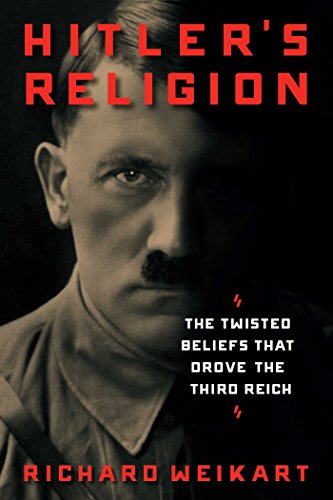(excerpts)
by Richard Weikart
 The authenticity of most of Hitler’s speeches and writings are uncontroversial, and I use them liberally. However, some have questioned Hitler’s Table Talks as a reliable source for discovering Hitler’s views on religion. In an interesting piece of detective work, Richard Carrier demonstrates convincingly that the English version of Hitler’s Table Talk is based on the translation of a problematic and possibly inauthentic text.[1] Thus, I do not use nor cite the English translation of Hitler’s Table Talk. However, even Carrier admits that the two German editions edited by Henry Picker and Werner Jochmann are generally reliable. Carrier was hoping that debunking Hitler’s Table Talk would demolish the image of Hitler as an anti-Christian that many scholars have built on this flawed document. Unfortunately for Carrier, Hitler is every bit as anti-Christian in the Jochmann and Picker editions.
The authenticity of most of Hitler’s speeches and writings are uncontroversial, and I use them liberally. However, some have questioned Hitler’s Table Talks as a reliable source for discovering Hitler’s views on religion. In an interesting piece of detective work, Richard Carrier demonstrates convincingly that the English version of Hitler’s Table Talk is based on the translation of a problematic and possibly inauthentic text.[1] Thus, I do not use nor cite the English translation of Hitler’s Table Talk. However, even Carrier admits that the two German editions edited by Henry Picker and Werner Jochmann are generally reliable. Carrier was hoping that debunking Hitler’s Table Talk would demolish the image of Hitler as an anti-Christian that many scholars have built on this flawed document. Unfortunately for Carrier, Hitler is every bit as anti-Christian in the Jochmann and Picker editions.
The Picker and Jochmann editions of Hitler’s Table Talk monologues are very similar—indeed verbatim—in many passages. Each contains some passages not found in the other one. However, when comparing the many passages they share in common, most of them are identical, though occasionally there are very minor differences. Oddly, Carrier maintains that Picker is probably more reliable than Jochmann, but this is not the opinion of most scholars. I have read both editions and will rely mostly on Jochmann, though many of the passages I quote are in both editions. I will only use Picker sparingly and to confirm points Hitler made elsewhere, not to try to establish some unique point. We also need to remember that these monologues are not transcriptions of Hitler’s talks, but are reconstructions based on notes taken during the monologues. Based on some testimony of those present at these monologues, the renditions we have are generally accurate, since they were written immediately afterwards.
The only book Hitler published during his lifetime, Mein Kampf, poses a different kind of problem. It is notoriously unreliable as a memoir, and many scholars—myself included—consider some of the vignettes about his earlier life completely fictitious. It does, however, accurately convey Hitler’s ideology, as does Hitler’s Second Book, which was only discovered after World War II.
Two other contemporary sources—Joseph Goebbels’ diaries and the recently recovered Alfred Rosenberg diaries—confirm the general account of Hitler’s monologues. My book is one of the first to use Rosenberg’s diaries, which do not divulge anything that overturns our previous knowledge about Hitler, but rather corroborate other sources and provide some interesting details…
Where I use English language sources, in most cases I have read the original German to verify the accuracy of the translation.
___________
[1] Richard C. Carrier, ‘Hitler’s Table Talk: Troubling Findings’, German Studies Review, 26 (2003): 561-76.
One reply on “A note on sources”
Well, that’s odd. This is what Thomas Dalton said in the introduction of the new translation of Mein Kampf: